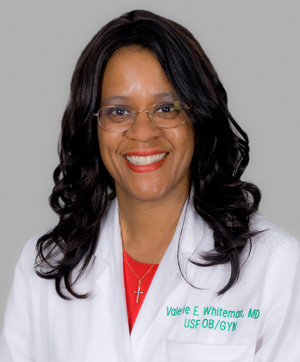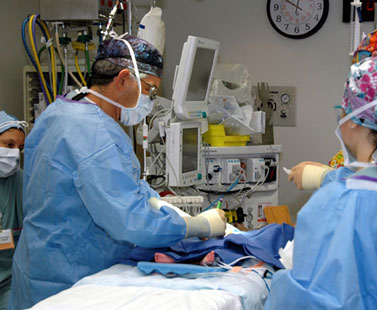USF-TGH medical team performs first EXIT procedure
The uncommon, high-risk delivery involved more than 20 physicians and other health practitioners
Read St. Petersburg Times story…
Tampa, FL (Nov. 12, 2009) — A multidisciplinary team of USF Health and Tampa General Hospital physicians recently performed the first Ex Utero Intrapartum Treatment (EXIT) at TGH — successfully securing an airway for a baby girl with a large benign tumor wrapped around her neck before fully delivering the 7 pound, 11 ounce infant by Cesarean section.
EXIT is an innovative procedure developed to deliver infants with severe congenital abnormalities that may make breathing after delivery difficult or impossible. During EXIT, the newborn is partially delivered in a manner similar to a C-section, but the umbilical cord supplying oxygen from mother to baby is not immediately cut. Instead, the baby is intubated — a breathing tube is inserted through the mouth or nose into the windpipe – and delivery of the infant is completed and cord cut only after a clear airway has been established.
“The biggest challenge in this type of procedure is establishing an airway for the fetus while maintaining a steady supply of oxygen so that no neurological damage occurs,” said Valerie Whiteman, MD, lead USF obstetrician for the EXIT delivery on Oct. 1. “If you can’t successfully intubate on the first attempt, surgical intervention is required and that potentially increases the risk for both the fetus and mother.”

Dr. Valerie Whiteman, interim director of Maternal-Fetal Medicine at USF Health, led the EXIT delivery.
This challenging, uncommon procedure (only about 100 cases have been documented in the United States) required extensive, seamless coordination by the USF-TGH team of 20-plus physicians, nurses and other health professionals assembled inside and just outside the operating room.
The following were the key physicians on the EXIT delivery team:
• Maternal-Fetal Medicine — Dr. Valerie Whiteman, USF assistant professor of obstetrics and gynecology and interim director of Maternal-Fetal Medicine, assisted by Dr. Aaron Deutsch, senior maternal fetal medicine fellow
• Anesthesia – Dr. Devanand Mangar, anesthesiologist with Gulf-to-Bay Anesthesiology and chief of staff at Tampa General Hospital, and Dr. Amrat Anand, Gulf-to-Bay anesthesiologist
• Neonatalogy – Dr. Terri Ashmeade and Dr. Laura Haubner, both USF assistant professors of pediatrics, and Dr. Lewis Rubin, professor and chief of neonatology at USF
• Pediatric Surgery – Dr. Charles Paidas, director of USF Division of Pediatric Surgery
Patty Bornick, RN, MSN, perinatal navigator for the USF Health Fetal Care Center of Tampa Bay, coordinated care for the high-risk obstetric patient, a 31-year-old woman who lives in Tampa with her husband and two other children.
Anesthesiologists delivered anesthesia to the mother and a medication to prevent contractions during intubation. Obstetricians performed the high-risk surgical delivery using a special autosuturing device to minimize maternal bleeding. Neonatologists intubated once the infant’s head and shoulders were delivered and assessed the baby after birth. The pediatric surgeon was on standby in case intubation proved difficult, so that some of the tumor could be cut away or a hole could be made in the windpipe. The infant’s heart rate was continually monitored by ultrasound for any signs of oxygen loss.
The USF-TGH team established protocols and contingency plans for the surgery and practiced with two dry runs in the operating room in August and September. During the actual EXIT procedure, intubation was successful on the first attempt.
“We were all familiar with our roles, our equipment and what steps needed to be taken when. We prepared for the best and worst case scenarios. It took teamwork, teamwork and more teamwork,” Dr. Whiteman said. “This EXIT procedure required tremendous collaboration, and the successful outcome speaks well of the partnership between TGH and USF and our extensive resources.”
“Preparing for the procedure with Dr. Laura Haubner, director of the Department of Pediatrics Center for Team Education and Multidisciplinary Simulation was vital,” said Dr. Ashmeade, the neonatologist who placed the breathing tube. “She is an expert in critical resource management and patient safety. I knew that she was aware of the entire situation in the operating room, which allowed me to concentrate solely on securing the baby’s airway.”

USF pediatric surgeon Dr. Charles Paidas has already performed one surgery to begin removing the benign tumor wrapped around the baby’s neck.
The baby was discharged home from Tampa General’s neonatal intensive care unit on Oct. 12. The benign tumor, a cystic hygroma, will be resected in two stages because it is attached from the base of her skull to her tongue, and surrounds her heart, windpipe and great vessels. She underwent a first operation Oct. 30 to remove the neck portion of the hygroma. In two to three months, a second operation will remove the remainder of the tumor in her right chest.
“This was not simply a team, but a team that practiced all aspects of the planned procedure and practice makes perfect,” Dr. Paidas said.
– USF Health –
USF Health is dedicated to creating a model of health care based on understanding the full spectrum of health. It includes the University of South Florida’s colleges of medicine, nursing, and public health; the schools of biomedical sciences as well as physical therapy & rehabilitation sciences; and the USF Physicians Group. With more than $380.3 million in research grants and contracts last year, USF is one of the nation’s top 63 public research universities and one of 39 community-engaged, four-year public universities designated by the Carnegie Foundation for the Advancement of Teaching. For more information, visit www.health.usf.edu
– Tampa General Hospital –
Tampa General is a 988-bed acute care hospital on the west coast of Florida that serves as the region’s only center for level I trauma care, comprehensive burn care and adult solid organ transplants. It is the primary teaching hospital for the University of South Florida College of Medicine. TGH is also one of only 16 comprehensive stroke centers in Florida and is a state-certified spinal cord and head injury rehabilitation center.
– News release by Anne DeLotto Baier, USF Health Communications

